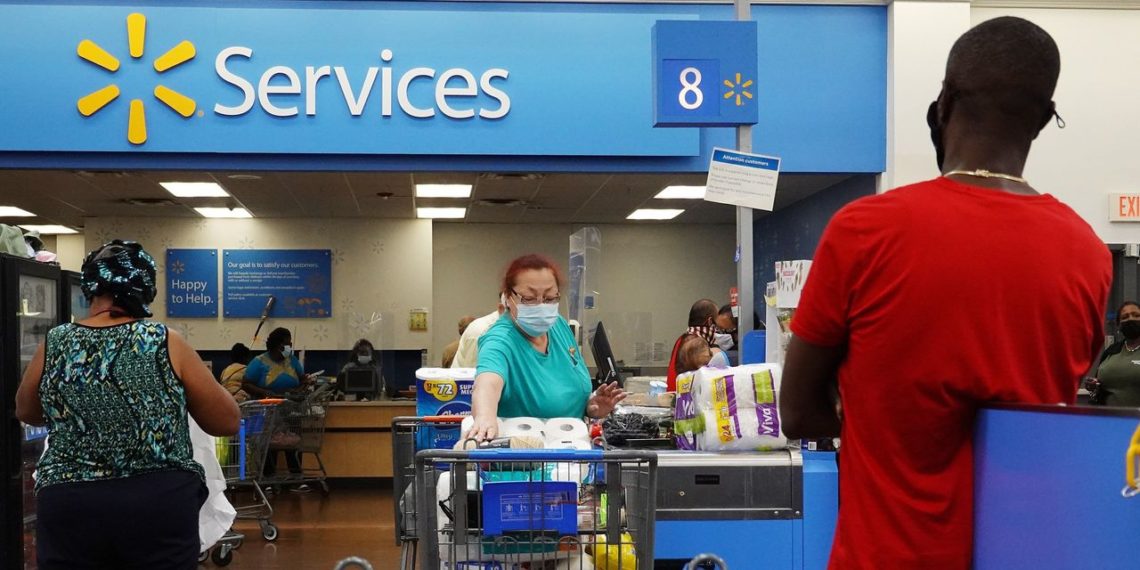The retail giant is helping launch a new company, helmed by two former
Goldman Sachs Group Inc.
GS 2.01%
executives, that aims to provide financial services for its millions of customers and workers. The firm is a joint venture with
Ribbit Capital,
LEAP -0.10%
known for investing in
Robinhood Markets Inc.
HOOD 0.64%
and other digital financial businesses.
Options under consideration include building a user base around mobile payments, as well as potentially buying a startup that offers consumer bank accounts through a mobile app, known as a neobank, according to people familiar with the situation.
The venture doesn’t plan to seek a banking license, according to the people.
Walmart is the majority owner of the business, which has yet to be named publicly. The venture has hundreds of millions of dollars in commitments from its new backers, the people said, and it is likely to acquire other companies to jump-start the business, not build the bulk of the technology in-house.
Executives at the new company, including
Omer Ismail,
former head of Goldman’s consumer banking unit called Marcus, and David Stark, a top executive at Marcus, officially started in August and plans are still in flux, the people said. The startup recently hired Chris Faught, a former
Apple Inc.
and
Affirm Holdings Inc.
executive, to help craft its strategy, the people said.
Mr. Ismail and Mr. Stark are rerunning some of the same plays at the new venture as they did at Goldman. Acquisitions of companies including budgeting app Clarity Money helped Marcus add engineers and speed up its entry into new products and services. At the Walmart-Ribbit venture, the two executives have held deal talks with dozens of startups, the people said.
For decades Walmart has tried various ways to grow its financial services business, but it remains a small piece of the company’s $559 billion in annual revenue. In recent years, fintech businesses have proliferated, leaving Walmart in a crowded, competitive field. Companies like Chime Financial Inc., a neobank that doesn’t charge account fees, and Square Inc.’s Cash App, a digital money-transfer service, have built big followings among the low-income shoppers that make up Walmart’s core customer base.
The new venture is also part of Walmart’s current strategy to create new sources of profitable revenue beyond supercenters, mirroring Amazon’s model of making money selling cloud computing services and advertising.
Meyer Malka, the managing partner of Ribbit Capital who goes by “Micky,” wooed the Goldman executives and brought the idea of a joint venture to Walmart’s leaders, the people said. Mr. Malka has long been interested in how to build financial products that appeal to the masses. Ribbit Capital was an early investor in startups like Robinhood and Credit Karma Inc. that attracted tens of millions of users by using technology to expand access to borrowing, banking and investing.
At Goldman, the consumer-banking business that Mr. Ismail and Mr. Stark helped build generated $734 million in revenue in the first half of the year, about 2% of Goldman’s total. Marcus has struggled to earn a profit since its 2016 launch due in part to higher-than-expected loan losses and elevated marketing and partnership expenses.
The Goldman executives were wary about working under a massive firm such as Walmart, according to the people. They were enticed by the idea of building a new business with access to Walmart’s existing 160 million weekly shoppers and consumer data that could help solve the profitability challenges they faced building a business from scratch at Goldman, the people said.
Walmart launched its own mobile payment service inside its shopping app in 2015, but Walmart Pay hasn’t gained widespread use among Walmart shoppers, a disappointment to some top Walmart executives and board members, say people familiar with the situation. Walmart Pay can’t be used outside of Walmart’s stores and the retailer never built a stand-alone app for it.
In the mid-2000s, Walmart asked banking regulators to grant it a charter for an industrial loan company, which would have allowed it to operate a bank unit. After many members of Congress expressed their wariness of Walmart’s plans, the company abandoned the effort in 2007. It partners with banks and startups to offer shoppers prepaid debit cards, workers pay advances and other services.
In choosing not to pursue a banking license, the new venture will be subject to less direct oversight from regulators, but will also be unable to offer bank accounts or issue debit or credit cards on its own.
“The financial services we’ve had have been fairly limited in scope,” Walmart Chief Financial Officer
Brett Biggs
said in an August interview. Mr. Biggs sits on the board of the new joint venture. “Some of them have had scale,” Mr. Biggs said, “but partnering with someone like Micky, Ribbit and Omer gives us a chance to think outside the box.”
Mr. Biggs declined to comment on specific plans for the new venture. “Anything we do would be about scaling things we already do,” he said. “Higher adoption for Walmart Pay is definitely something that fits in with the ecosystem we are trying to build.”
Write to Sarah Nassauer at sarah.nassauer@wsj.com and Peter Rudegeair at Peter.Rudegeair@wsj.com
Copyright ©2021 Dow Jones & Company, Inc. All Rights Reserved. 87990cbe856818d5eddac44c7b1cdeb8
Credit: Source link





















